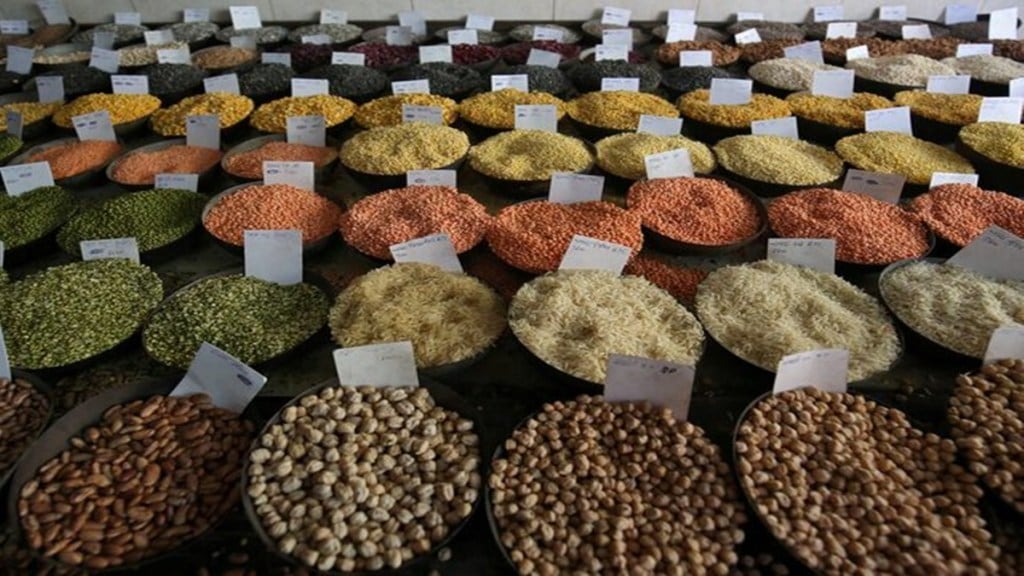A surge in cheap imports and robust harvest prospects have dampened mandi prices of key varieties of pulses – tur, urad, masoor and chana. Their prices are currently ruling significantly below the year-ago prices, as well as the respective minimum support prices (MSPs).
According to sources, with the inflation in pulses in the negative zone since the last seven months, the government is discussing the option of imposing duties on yellow peas shipments and other pulses so that domestic prices remain stable. Duties on import of pulses may soon be determined.
Cheap Imports Pressure Domestic Prices
Trade sources said the mandi prices of pulses varieties across major mandis on Saturday were below the year ago levels as follows: tur (38%), chana (25%), moong (18% ) and urad (15%).
This may, according to traders and processors, discourage farmers from sowing chana and masoor in the forthcoming rabi season.
Traders have urged the government to impose import duties on yellow peas and other pulses varieties so that landed cost of pulses are not below MSP and farmers are encouraged to grow more pulses.
Currently, -duty-free imports of yellow peas, tur and urad has been allowed till March 31, 2026, bengal gram and masoor has imported duty of 10% valid till end of FY26.
“With global supplies abundant, India needs only measured imports — enough to stabilize prices, but not enough to discourage sowing,” Harsha Rai, Head, Mayur Global Corporation, a leading pulses trading firm, told FE.
Recently Agriculture minister Shivraj Singh Chouhan has raised concern about continued duty-free import of yellow peas, used as a cheaper substitute of chana in the snacking industry, is leading to distortion of market prices. Chouhan has asked for re-imposition of 50% duties on shipments of yellow peas, imposed prior to its lifting in December, 2023.
India has imported a record 7.34 million tonne ( MT) of pulses in 2024-25. India imports about 15% to 18% of its annual pulses consumption mostly from Africa, Myanmar, Tanzania, Malawi, Mozambique, Canada, Russia and Australia.
Sources said the issue of continued duty-free import of yellow peas and duties on other pulses has been discussed in several inter-ministerial committee (IMC) meetings.
Sunil kumar Baldewa, president, Agri Farmer and Trade Association, in a communication to the government has raised concern about surge in cheaper import because of robust global crop is expected to hit sowing of pulses if import duties are not levied.
Policy Push to Align with MSP
Stating that aligning import duty structure with MSP will ensure remunerative prices to farmers and encourage them to increase area and production of pulses, the Commission for Agricultural Costs and Prices (CACP) in its report ‘price policy for kharif crops marketing season – 2025-26 – has recommended that imports of yellow peas should be banned and import duty on other pulses, particularly, tur or arhar, lentil and urad should be increased.
The pulses production in the 2024-25 crop year (July-June) is estimated at 25.23 MT, 4% higher than the previous year. The agriculture ministry has set a target of 27 MT of pulse production for the 2025-26 crop year.
Inflation in pulses declined by 14.53% in August for seven successive months on the prospects of robust harvest as well as adequate imports. Inflation in pulses was as high as 113% in August,2024.
Sources said against the buffer norm of 3.5 MT, which the government needs to carry out a market intervention programme for curbing the possibility of rise in prices, the agencies – farmers’ Nafed and National Cooperative Consumers Federation – currently hold 2.48 MT of pulses.
Out of which a major chunk of stock is moong (0.90 MT), masur (0.64 MT) and tur (0.60 MT). Some of the masur stocks were created through imports.
Over 3.5 MT of yellow peas have been imported since December 2023. Trade sources said currently around 1 MT of the pulses variety are with importers while domestic production is around 0.45 MT which would be sufficient to meet domestic demand.
